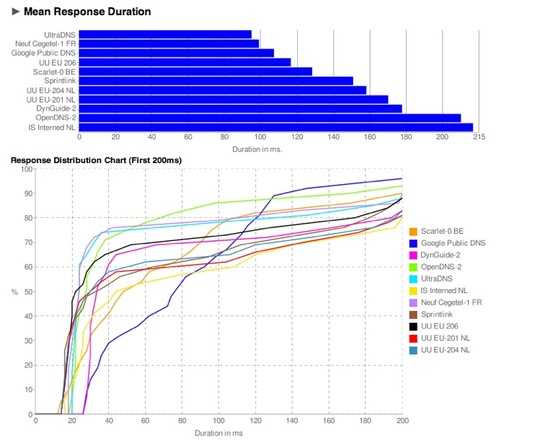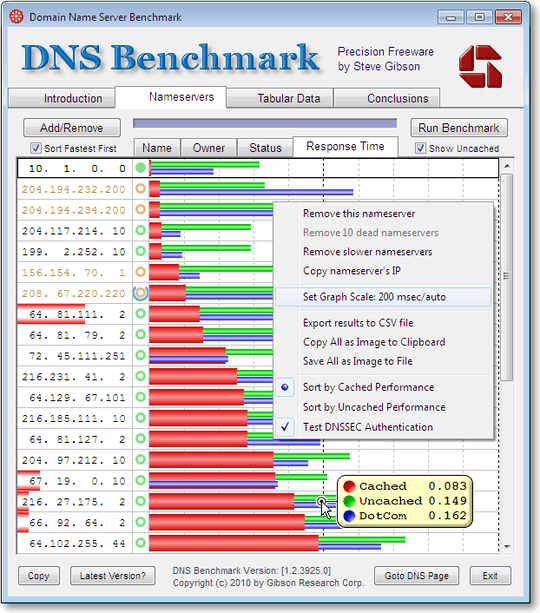My ISP = faster (closer to me)
This is a common misconception, distance does not make up speed on its own. Compare using the old single network cables out of metal to the newer multiple glass fibre cables systems, like EuroDOCSIS 3.0.
Other than propagation delay, you also have a processing delay on the server; I'm pretty sure that the DNS server at an ISP is less powerful to a DNS server hosted by Google, hence it is completely possible or a server that's at a much greater distance to actually be faster than your ISP's DNS server...
Hosting your DNS router/server might be the fastest, though it doesn't have all the DNS records stored!
namebench by Google can help you pick out a better DNS server, the rest in your question is subjective.
Are you a power-user with 5 minutes to spare? Do you want a faster internet experience?
Try out namebench. It hunts down the fastest DNS servers available for your computer to use. namebench runs a fair and thorough benchmark using your web browser history, tcpdump output, or standardized datasets in order to provide an individualized recommendation. namebench is completely free and does not modify your system in any way. This project began as a 20% project at Google.
namebench runs on Mac OS X, Windows, and UNIX, and is available with a graphical user interface as well as a command-line interface.
Here are the screens you will go through while using this program:



There is also a command line version there:
Final list of nameservers considered:
------------------------------------------------------------------------------
130.85.1.5 UMBC 5 US 56 ms |
208.67.222.220 OpenDNS-3 56 ms | www.google.com is hijacked: google.navigation.opendns.com
209.244.0.4 Level3-R2 62 ms |
216.146.35.35 DynGuide 63 ms | NXDOMAIN Hijacking
204.9.56.9 BroadAspect US 63 ms |
8.8.4.4 Google Public DNS- 64 ms | Replica of Google Public DNS [8.8.8.8]
208.67.220.220 OpenDNS 65 ms | www.google.com is hijacked: google.navigation.opendns.com
156.154.70.1 UltraDNS 67 ms | NXDOMAIN Hijacking
127.0.0.1 Localhost IPv4 68 ms | NXDOMAIN Hijacking (www)
209.18.47.61 RoadRunner NC US 68 ms | Replica of RoadRunner NC-2 US [209.18.47.62], NXDOMAIN Hijacking (www)
156.154.71.22 Comodo Secure DNS- 80 ms | NXDOMAIN Hijacking
209.18.47.62 RoadRunner NC-2 US 104 ms | (excluded: Slower replica of RoadRunner NC US [209.18.47.61])
- Sending 250 queries to 11 servers...
Mean response (in milliseconds):
--------------------------------
Google Public DN ################# 64.85
Comodo Secure DN ################### 72.84
RoadRunner NC US ####################### 91.19
UltraDNS ####################### 91.61
Localhost IPv4 ########################### 108.66
OpenDNS ############################ 110.69
OpenDNS-3 ###################################### 149.85
DynGuide ####################################### 156.60
Level3-R2 ########################################### 169.81
UMBC 5 US ########################################### 172.63
BroadAspect US ##################################################### 214.19
Response Distribution Chart URL (200ms):
----------------------------------------
http://chart.apis.google.com/chart?cht=lxy&chs=720x415&chxt=x,y&chg=10,20&chxr=0,0,200|1,0,100&chd=t:0,8,8,9,10,1...
Response Distribution Chart URL (Full):
---------------------------------------
http://chart.apis.google.com/chart?cht=lxy&chs=720x415&chxt=x,y&chg=10,20&chxr=0,0,3500|1,0,100&chd=t:0,0,0,1,1,1...
Recommended configuration (fastest + nearest):
----------------------------------------------
nameserver 8.8.4.4 # Google Public DNS-2
nameserver 127.0.0.1 # Localhost IPv4
nameserver 209.18.47.62 # RoadRunner NC-2 US




14
Associating DNS queries to accounts based only on the IP address is nonsense and Google would know that. They also claim that no identifiable information is logged for more than two days. On the other hand, OpenDNS can associate your IP addr to an email address based on the information you gave when signing up for "stats". Finally, whichever DNS provider you choose, your ISP still sees the requests made. (A few ISPs even silently redirect all DNS queries...)
– user1686 – 2012-02-07T14:44:50.4175
You're missing an option, using your own DNS resolver, Unbound is a good example of a multi-platform one.
– Shadok – 2012-02-07T14:46:34.393@Shadok eventually my own DNS resolver will have to make requests to another DNS. – Jader Dias – 2012-02-07T14:52:52.090
@grawity From the information you provided I concluded that my ISP is the best option in terms of speed, privacy and perhaps reliability. – Jader Dias – 2012-02-07T14:54:11.730
11@JaderDias: Your own resolver, when put in recursive mode, can send requests to the content DNS servers directly, which does not create privacy issues. – user1686 – 2012-02-07T14:57:52.987
@grawity you just beat me to it, Unbound does recursive requests (beside caching them). – Shadok – 2012-02-07T16:03:53.923
3Google do not associate DNS requests to your Google Account - their privacy statement and FAQ are very clear on this. – BrianEss – 2012-02-07T20:29:35.113
3My ISP = faster (closer to me) but less privacy (they can associate my DNS requests to myself) Precisely the opposite in my experience and why I chose OpenDNS, it was faster. – Fiasco Labs – 2012-02-07T20:41:50.693
I have no idea how this got so many views. Who cares about what DNS you use? Fight for choice in ISPs!! – surfasb – 2012-02-07T22:07:15.143
@surfasb: It has been Jeff Atwood'd.
– user1686 – 2012-02-07T23:11:57.957I've added a piece about the "My ISP = faster (closer to me)" in my answer. – Tamara Wijsman – 2012-02-08T00:41:23.937
If you want OpenDNS with basic filtering and no software or account necessary consider their family shield option https://store.opendns.com/familyshield/setup/
– Dennis – 2012-02-08T09:53:48.720